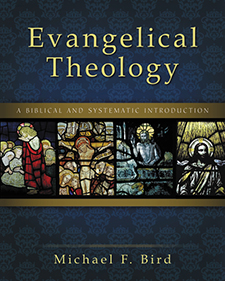 A review of Evangelical Theology – A Biblical and Systematic Introduction by Michael F. Bird. Published by Zondervan.
A review of Evangelical Theology – A Biblical and Systematic Introduction by Michael F. Bird. Published by Zondervan.
In my years as a theological lecturer and pastor, I have been on the hunt for a good one-volume introduction to the discipline of theology.
Sometimes, it has seemed like the nineteenth century search for the Australian inland sea. It seems like it just has to be out there somewhere, but it never seems to appear.
For much of the twentieth century, this role was taken by Louis Berkhof’s admirable if limited volume, Systematic Theology. Berkhof was worthy, but did little to excite anyone about the study of theology. Writing from a Reformed perspective, he was too readily accused of two of the greatest vices of systematic theology: proof texting, and forcing Scripture into his system.
Proof texting is the listing of Bible verses that are supposed to support a contention. It is not necessarily a bad practice, but it makes the Bible into a kind of compendium of facts, or a mountain of truths not necessarily connected. There is not enough recognition of the grand sweep of the narrative of Scripture. The texts are removed from their context.
This problem bedevils Wayne Grudem’s popular replacement for Berkhof, also called Systematic Theology. Grudem’s book is in wide use across the world, but is deeply unsatisfactory in its use of proof-texting.
The second vice is the suspicion that a system is being imposed as a grid upon Scripture. Verses are then squeezed into the system, rather than given their own voice. Once again, Berkhof and Grudem, for all their virtues, give you little confidence that they don’t already know the answer to the questions they are asking the Bible.
This is why I am very excited by my friend Dr Michael Bird’s new book Evangelical Theology – A Biblical and Systematic Introduction. Here is the one volume theology I can finally give to lay leaders and theological students.
Why do I like it?
First: although Bird teaches Systematic Theology at Melbourne’s Ridley College, he is first and foremost a New Testament scholar – and a widely published one at that. Bird is at the cutting edge of Bible scholarship. Now this could mean that he is too inexpert to swim in the murky waters of Systematic Theology.
But that is not in fact the case. For the task at hand – an introductory one volume theology – Bird is the right man. He is not cutting new ground as a systematic theologian in this book. But he is doing theology by the right method, that is, starting with the Bible.
Second, Bird understands Biblical Theology properly, so he doesn’t proof text. Bird actually helps us to read the Bible better because he understands that Scripture isn’t a bunch of facts, but a story of salvation.
Third, Bird starts, as an evangelical should, with the gospel. That is, his theology is not an examination of the Westminster Confession of Faith, or the Synod of Dordt, or an explanation of the teachings of the institutional Church: it is an outworking of the great announcement of the victory of Christ over evil.
Fourth, Bird avoids the evangelical temptation to neglect the history of debates over theology over the last two millennia. Evangelical Theology plunges you in to all those debates and gives you a clear and succinct account. Bird’s tendency (like my own) is to find a safe middle-ground from which to arbitrate between these positions, but he doesn’t simply give you his own position as if it is the only one. The discussion of Limited Atonement, a controversial subject if ever there was one, is a case in point. Bird tells you what he thinks, but gives a fair account of the options.
Fifth, Bird has an eye for contemporary debates. Evangelical theology has to survive in the contemporary world by addressing the questions that are there. Bird does not pretend that post-modernity never happened, but he does not simply give in to it either (as the Baptist theologian Stanley Grenz does in his Theology for the Community of God). He learns, but he critiques.
Lastly, Bird writes with a great deal of passion and wit. His prose is not weighed down by jargon (as Michael Horton’s often is in The Christian Faith.) This means that this book is actually useful not only for first year students but for lay people. It is a fun read: I can safely say that this is the funniest Systematic Theology I have ever read.
There’s no such thing as the definitive single-volume systematic theology. I certainly disagree with Bird about some matters of eschatology, for example. I would also say that he has a tendency to take the middle path between two extremes as a default, but is that the way the truth works?
Nevertheless, his book deserves to gain a wide readership, and I would recommend that theological colleges explore it as a first year text.
Michael Jensen is the Rector at St Mark’s, Darling Point, and former lecturer in doctrine at Moore Theological College. He is a regular columnist for Eternity newspaper, and the author of several books, including the recently released Pieces of Eternity.
Email This Story
Why not send this to a friend?
